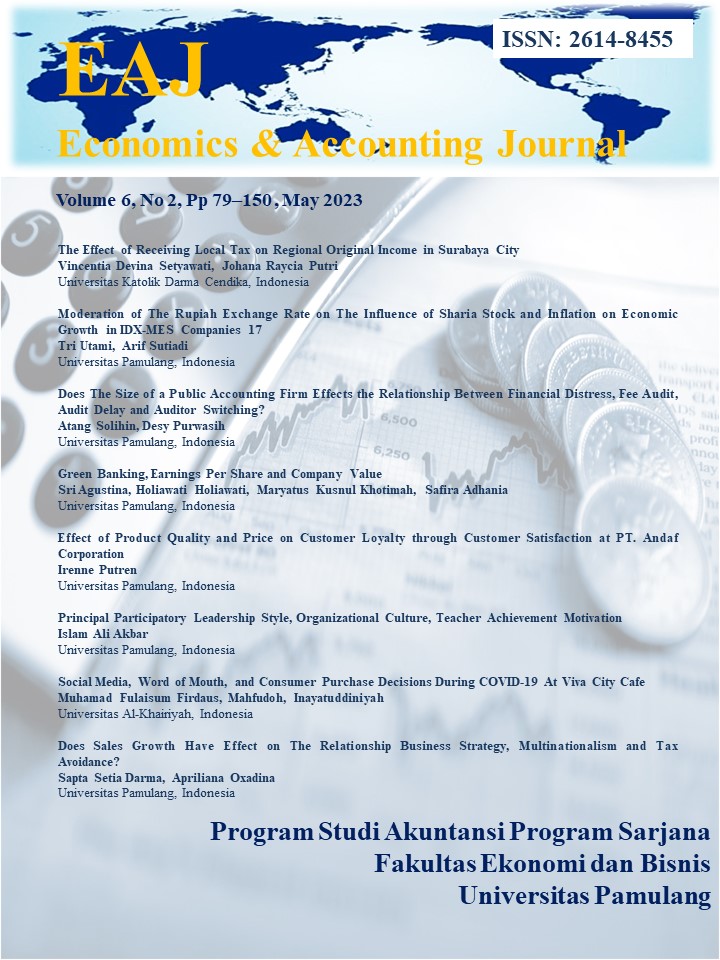Principal Participatory Leadership Style, Organizational Culture, Teacher Achievement Motivation
DOI:
https://doi.org/10.32493/eaj.v6i2.y2023.p131-140Keywords:
Participatory Leadership, Organization Culture, Motivation AchievementAbstract
This survey aims to explore how the Participatory Leadership Style of Principals impacts organizational culture and teacher motivation achievement in Integrated Islamic Primary Schools located in Pondok Aren South Tangerang, Banten. The study involved 204 teachers, with 135 samples collected using a random sampling technique. A correlation technique using a questionnaire was used to analyze the data. The study revealed that there is a positive and significant relationship between the Participatory Leadership Style of Principals and teacher achievement motivation, as well as between organizational culture and achievement of teacher motivation. Moreover, there is also a positive and significant relationship between the Participatory Leadership Style of the principal and organizational culture together with teacher motivation achievement.
References
Abbas Ghozali, Tinjauan Literatur : Effective School Research, Jurnal Pendidikan dan Kebudayaan, No. 021. Tahun ke-5, Januari 2000, Balitbang Depdiknas
Badeni. (2013). Kepemimpinan dan Perilaku Organisasi. (Bandung: Alfabeta).
Danim, Sudarwan.(2010). Inovasi Pendidikan Dalam Upaya Peningkatan Profesionalisme Tenaga Kependidikan. (Bandung: CV. Pustaka Setia).
Ferry, L., & Ahrens, T. (2016). Leadership Style and Job Satisfaction in Higher Education Institutions. International Journal of Educational Management, 30, 140–164
Gary Yuki. (2006). Leadership in Organization. New Jerseu: Prentice Hall.
Hasan Basri. (2014). Kepemimpinan Kepala Sekolah. (Bandung : Pustaka Setia).
Liu, S., Hallinger, P., & Feng, D. (2016). Supporting the professional Learning of Teachers in China: Does Principal Leadership Make a Difference? Teaching and Teacher Education, 59, 79–91. https://doi.org/10.1016/j.tate.2016.05.023
Mangkunegara, A. P. (2006). Evaluasi kinerja SDM. (Bandung: PT Refika Aditama).
Masrukhin dan Waridin. 2006. Pengaruh motivasi kerja, kepuasan kerja, budaya organisasi dan kepemimpinan terhadap kinerja pegawai. Jurnal Ekonomi dan Bisnis (EKOBIS) 7(2): 197–209.
Mangkuprawira, Sajfri. 2014. Manajemen Sumber Daya Manusia Strategik. (Bogor : Ghaliya Indonesia).
Megan Crawford, Lesley Kydd and Colin Riches. (2005). Kepemimpinan dan Kerjasama Tim dalam Manajemen Kependidikan, terjemahan Erick Dibyo Wibowo. (Jakarta: Grasindo).
Notoatmodjo, Soekidjo. (2009). Pengembangan Sumber Daya Manusia. (Jakarta: Rineka Cipta)
Nurani, R. T., & Sarino, A. (2017). Kepemimpinan Kepala Sekolah , Supervisi Akademik , dan Motivasi Kerja dalam Meningkatkan Kinerja Guru. Jurnal Pendidikan Manajemen Perkantoran, 2(1), 298. https://doi.org/10.17509/jpm.v2i1.14613.
Rivai, Veithzal, 2015. Manajemen Sumber Daya Manusia Unuk Perusahaan, Edisi Kedua. (Jakarta : Raja Grafindo).
Robbins, S.P., & Judge, T. (2011). Organizational behavior (14th ed.). (New Jersey: Prentice Hall).
Sudarwan Danim. (2012). Kepemimpinan Pendidikan. (Bandung: Alfabeta).
Suradji, G., & Martono, E., 2014. Ilmu dan Seni Kepemimpinan. (Bandung: Pustaka Reka Cipta).
Sutarto Wijono. (2012), Psikologi Industri dan Organisasi, ( Jakarta :Kencana Prenada Media Group).
Suyitno, S. (2021). Pengaruh Keterampilan Manajerial Kepala Sekolah dan Peran Komite terhadap Efektivitas Manajemen Berbasis Sekolah. Jurnal Basicedu, 5(3), 1564–1576. https://doi.org/10.31004/basicedu.v5i3.970
Wahyusumidjo. (2011). Kepemimpinan Kepala Sekolah. (Jakarta: PT. Raja Grafindo Persada).
Wirawan. (2006). Kapita Selekta 1: Teori Kepemimpinan Pengantar untuk Praktek dan Penelitian. (Jakarta: Yayasan Bangun Indonesia dan Uhamka Press)
Published
Issue
Section
License
Copyright (c) 2024 Islam Ali Akbar

This work is licensed under a Creative Commons Attribution-NonCommercial-ShareAlike 4.0 International License.
Authors who publish with this journal agree to the following terms:
- Authors retain copyright and grant the journal right of first publication with the work simultaneously licensed under a Creative Commons Attribution License that allows others to share the work with an acknowledgement of the work's authorship and initial publication in this journal.
- Authors are able to enter into separate, additional contractual arrangements for the non-exclusive distribution of the journal's published version of the work (e.g., post it to an institutional repository or publish it in a book), with an acknowledgement of its initial publication in this journal.
- Authors are permitted and encouraged to post their work online (e.g., in institutional repositories or on their website) prior to and during the submission process, as it can lead to productive exchanges, as well as earlier and greater citation of published work (See The Effect of Open Access).

This work is licensed under a Creative Commons Attribution-ShareAlike 4.0 International License.


